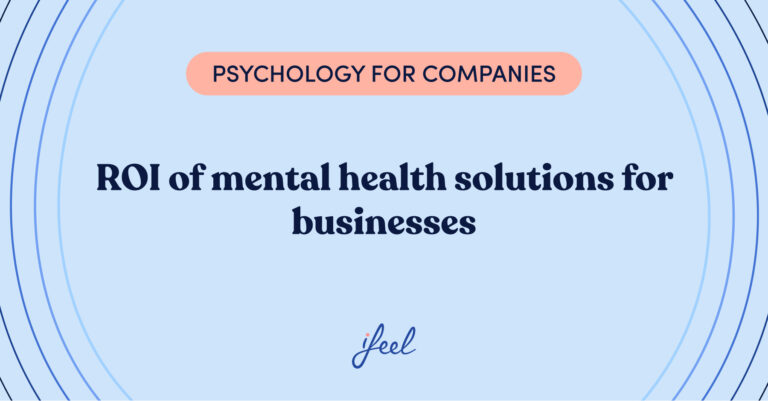For some years now, the figure of the Mental Health Mentor has begun to position itself as an essential component of mental health strategies within large and diverse organisations.
The reason is not hard to guess. In a world where the importance of mental wellbeing to business success is finally being recognised, leaders and managers are challenged to integrate initiatives that not only promote a healthy work environment, but also address the emotional complexities that employees face on a day-to-day basis.
In this context, the Mental Health Mentor brings a proactive and personalised approach to corporate well-being, offering ongoing support that is vital both in times of stability and crisis, when stress and uncertainty can significantly impact team performance and morale. Let’s take a look at what this role is all about.
What is a Mental Health Mentor?
A Mental Health Mentor is a mental health professional, i.e., a psychologist , whose primary role is to support and guide employees within an organisation to promote their emotional and psychological well-being.
Unlike traditional human resources or talent management roles, the Mental Health Mentor focuses specifically on the mental health of individuals, offering a personalised and confidential approach that addresses the psychological needs of individuals. The main functions of the Mental Health Mentor include:
| Main functions of the mental health mentor | Description |
|---|---|
| Personalised counselling | Provides guidance and emotional support, helping to manage stress and anxiety, and implementing problem-solving strategies. |
| Well-being promotion | Develops programmes and workshops to psycho-educate about the importance of mental health and self-care practices, reducing stigma. |
| Crisis intervention | Acts as a first-line resource in crises, providing immediate support and referral to specialist services. |
| Fostering an inclusive environment | Collaborates to create an inclusive organisational culture, working on policies that support diversity and emotional support. |
This way, these mentors not only contribute to improving individual mental health, but also strengthen team cohesion and organisational culture.
Who can be a Mental Health Mentor?
Selecting a Mental Health Mentor is a critical process that should focus on choosing a highly qualified professional, preferably a psychologist with expertise in workplace well-being, such as ifeel’s clinical team.
The importance of psychologists taking on the mentor role lies in their specialised training to address the complexities of mental well-being in the corporate environment comprehensively. They have the tools and knowledge to create a safe, trusting environment that allows employees to express and manage their emotional concerns.
Characteristics of an effective Mental Health Mentor
A Mental Health Mentor should act as a guide and role model, bringing technical knowledge and interpersonal skills that enrich the mentee’s experience. Here are the essential qualities that an aspiring mentor should have:
1. Communication skills: Listening actively and communicating clearly and empathetically is essential to establish an effective connection with employees.
2. Self-motivation and commitment: A mentor must be proactive and genuinely committed to their mentee’s personal and professional development.
3. Knowledge of corporate culture: Understanding the company’s culture and values is essential to align mentoring objectives with organisational goals.
4. Collaborative spirit: Fostering an environment of collaboration and teamwork is crucial to integrating emotional well-being at all levels of the organisation.
5. Positive attitude and dedication: Maintaining a positive attitude and demonstrating high dedication levels helps inspire and motivate employees to achieve their goals.
It is important to note that while a mental health mentor can provide valuable interpersonal support, they should not be seen as a substitute for a professional therapist or counsellor. Instead, it acts as a complement to specialist services, providing a support network that maximises the benefits of any clinical counselling employees may receive.
Integrating psychologists with expertise in workplace well-being as mentors, it ensures that the mentoring program not only addresses the emotional needs of employees but also contributes significantly to creating a more positive and productive work environment. This holistic approach ensures that employees not only have access to emotional resources, but also benefit from ongoing, expert guidance that promotes their personal and professional growth.
Importance of mental health at work
Mental well-being in the workplace has become an essential priority, not only for the personal well-being of employees but also because it directly influences the quality of business results. If the people doing the work are not emotionally and mentally well, organisational productivity and achievement will be compromised. Studies reveal that 90% of employees consider mental health benefits a must.
Thus, having a Mental Health Mentor and providing ongoing support to employees is not just a gesture of goodwill but a key strategy to ensure employees feel valued and supported.
This holistic approach boosts morale and is indispensable to fostering a healthy and productive work environment where employee performance is sustainably enhanced. When employee well-being is prioritised, the results reflect the commitment of a motivated and balanced workforce.
“Before, my team managed all of this. Now, with ifeel as a partner, we can provide a higher level of wellness management, while leaving my team time to work on other projects beneficial to our employees.”
-Judith Palau, People Director at Mad Collective

Benefits of implementing a mental health mentoring programme
Today, having a Mental Health Mentor is not just a trend, not just one of the well-known employee benefits, but a strategic necessity for organisations looking to stay competitive in today’s business environment.
While the concept of mentoring is not new, its application in the field of mental health is becoming increasingly relevant. In fact, a Wall Street Journal article highlights that 70% of Fortune 500 companies already have formal mentoring programmes in place, underlining its importance in organizational success.
These statistics highlight the immense potential to expand these mental health mentoring programmes and take advantage of their proven benefits. The main benefits of implementing a Mental Health Mentoring programme include:
1. Promotions and career development:
Statistics show that employees who participate in mentoring programmes are five times more likely to be promoted than those who do not participate. This reflects how mental health support and personal development can accelerate employees’ professional growth.
2. Improved retention rates:
Organisations incorporating mentoring programmes record significantly higher retention rates, with 22% for apprentices and 20% for mentors. This increase translates into reduced costs associated with staff turnover and greater stability within the company.
3. Improved organisational climate:
Mentoring programmes foster a more inclusive and collaborative work climate by providing a psychologically safe space to discuss and address personal and professional concerns, which is essential for corporate well-being.
4. Increased productivity and engagement:
Employees who feel emotionally supported tend to show greater commitment to their tasks and thus increase their productivity. This engagement translates into better overall organisational performance.
Implementing a Mental Health Mentoring programme or having a Mental Health Mentor is, therefore, an investment in the company’s future. It not only improves the individual well-being of employees but also strengthens the organisational structure by promoting a healthier and more productive work environment.
How to implement a mental health mentoring programme
For organisations wishing to integrate the figure of a Mental Health Mentor, it is recommended to follow these steps:
- Needs assessment: Conduct surveys and consultations to identify areas for improvement in terms of mental health.
- Mentor selection: Recruit professionals with expertise in organisational psychology and workplace wellbeing.
- Programme development: Design intervention plans and educational workshops tailored to the characteristics and needs of the company.
- Monitoring and evaluation: Implement metrics to measure the impact of the programme and adjust as needed.

Trust the leaders
At ifeel, we know that including a Mental Health Mentor within corporate wellness strategies is a crucial step in maximising employee potential and ensuring a healthy work environment. By supporting employees in times of crisis and providing an effective employee assistance programme, companies not only fulfil their social responsibility, but also reap tangible long-term benefits.
To support companies in this process, our team of expert workplace well-being psychologists has created a mental well-being solution for businesses that improves talent retention, reduces presenteeism, and combats employee stress.
With our mental well-being solution, your company’s HR managers can receive personalised, data-driven advice on improving mental health at work. In addition, this solution offers employees a 360° mental well-being service structured at different levels according to their needs. Try our solution now to see how it could help you.
We hope you found this post about having a Mental Health Mentor interesting. If you would like more information about our mental well-being solution for companies, simply request it, and we will get in touch with your team as soon as possible.










